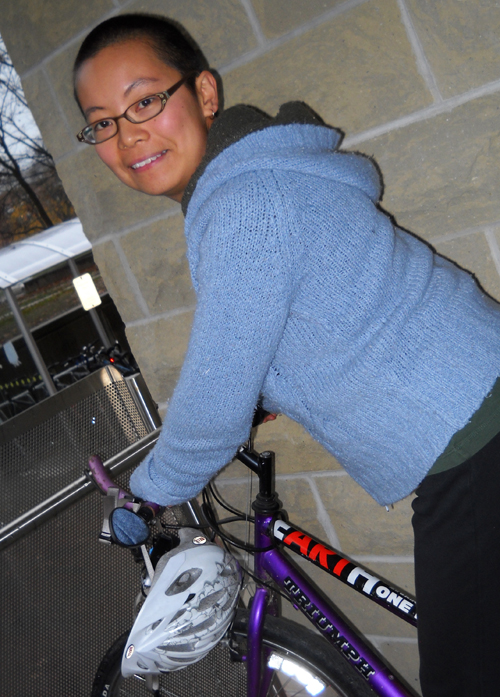
“It’s about making the story whole again.” That’s how Ingrid Ng describes her research and teaching interests as a PhD student studying ecology and environmental philosophy in U of G’s Department of Integrative Biology. Whether it’s finding ways to rescue degrading environments or connecting academic disciplines on campus, she’s keen to bring different viewpoints to bear on communities of creatures, including human ones.
Did you know that the U of G Arboretum contains some 18 natural and artificial ponds, including a couple of fair-sized pools in the woods? Most of them come and go – flush with spring rainwater and then more or less dry by the fall. Ng is interested in how creatures – mostly microscopic zooplankton – also come and go and have their being while they’re here.
She plans to sample invertebrates for microscopic studies in the lab of her supervisor, Prof. Karl Cottenie. But she wants to look at these mini ecosystems in more than one way.
She’s not a trained anthropologist – her master’s degree with Cottenie also looked at meta-community dynamics in pools. But she wants to see what she can see through a social scientist’s lens out there in the Arboretum.
Ng hasn’t quite figured out how that will work. She imagines that she’ll do what anthropologists do when they visit a distant community. That might involve simply immersing herself in what she calls the “everyday existence” of the pond.
“Instead of sampling zooplankton every two weeks, maybe I’ll camp out there for an extended period of time to experience and participate in a more complete ecology of the pond communities,” she says. “Who knows what I’ll find that I might miss or exclude with a standard scientific approach?”
She’ll look to extend that approach back in the lab or her grad student office in the Science Complex. So besides writing a scientific thesis, she wants to explore ways to tell a story, as an anthropologist might write a narrative of a population.
That would allow her to include emotional and perhaps spiritual aspects of pond life – or, more correctly, of the observer’s response to that living system. “The standard ecologist tells a story, but this would be a different part of the story,” she says. “That’s making the story more whole.”
That’s a favourite line of her co-adviser, Bob Jickling, a professor in the faculty of education at Lakehead University.
She admits that her approach is also making her doctorate more complicated. She’s still trying to weave those disparate interests into a coherent thesis proposal.
Ng believes there’s value in bringing together these varied disciplines, including revealing cultural assumptions that often divide and create misunderstanding between those areas. That interaction between disparate fields is what attracts Cottenie to her work. “I think that looking at the field from different perspectives will enrich it,” he says. “What she brings is an interest in philosophical and ethical perspectives. I think it will start to question a lot of implicit assumptions we are making in our research.”
Ng grew up in Richmond Hill and came to Guelph in 2003 to begin an undergrad in biology.
It was that B.Sc. that helped point her to her current topic. She wrote her undergrad thesis on rock pools in Churchill, Man., long a field study site for Guelph researchers. Ng ended up co-authoring a paper on zooplankton dispersal that was published in 2009 in Hydrobiologia.
A sense of caring for their study subjects links both ecologists and anthropologists, she says. A key difference is that the latter study human beings who carry intrinsic value and who deserve moral consideration. Do we regard a body of water in the same way? Some might, but not everyone does, says Ng.
“It’s not an accepted norm that what we study has intrinsic value. Is a lake important in and of itself, not because it does something for us but simply because it’s a lake?” That kind of question matters in assessing so-called ecosystem services (the value of clean air, soil or water) and in considering ethics of ecological research, whether you’re collecting zooplankton or tagging polar bears.
“Environmental healing” will be the topic of a new first-year seminar (FYS) that she and her supervisor will teach in the winter semester. Drawing on local issues – a water-bottling plant, say, or housing and businesses abutting a creek – they hope to engage their 11 students in varied disciplines: environmental philosophy, environmental education, anthropology, conservation biology and ecology.
They also hope to turn the class into a “deep community” of learners. That idea resonates especially with Ng, who encountered a similar approach during her formative summer of 2010.
That’s when she took part in the Otesha Project, an annual program run in Ottawa by students interested in environmental and justice issues. (The project began in Kenya in 2002; “otesha” means “reason to dream” in Swahili.) Ng was one of 19 Canadians who took part that year, including a two-month cycling trip around Ontario.
Before that summer, she says, “in groups of that size, it would be rare for me to speak up.” Some 2,000 kilometres later, things had changed.
“In that space, we created a community where everyone had the space, silence and time to critically reflect about whatever issues arose. We had built trusting relationships such that we could voice opinions honestly and be accepted unconditionally. It helped me find my voice and confidence.”
She says the bike tour helped her think about different ways of learning and teaching, and showed her where her motivation lies. “The FYS is about transforming the classroom into a community, and I would not have conceived this idea at all if I hadn’t experienced community in the first place.”